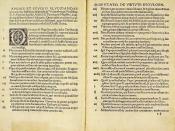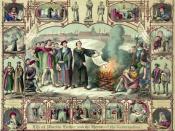In the Roman Catholic Church, an indulgence is the remission of the punishment that remains due for sin after sacramental absolution. This remission, which is granted by ecclesiastical authority, applies only to temporal punishment, in this world or in purgatory, and is to be distinguished from divine forgiveness.
Johann Tetzel, a German Dominican friar, was a preacher of indulgences. The system of indulgences, which developed out of the penitential discipline of the early church, became, in the medieval period, a means by which punishments for breaches of church discipline were commuted for proportionate fines. This practice was so general that the sale of indulgences was an important source of church revenue. The proceeds were used for many worthy purposes, such as the maintenance of religious orders and the building of churches. But the system was also subject to much abuse. Tetzel's promotion of the indulgence issued for the rebuilding of Saint Peter's in Rome, this aroused the anger and led to the protest of Martin Luther, whose 95 theses against the misuse of indulgences in 1517 precipitated the Reformation in Germany.
At the Council of Trent, the Roman Catholic Church reformed the system, which was continued only under carefully controlled conditions. A decree of Pope Pius V in 1567 finally prohibited the sale of indulgences.
The Reformation of the 16th century was a movement within Western Christendom to purge the church of medieval abuses and to restore the doctrines and practices that the reformers believed conformed with the Bible and the New Testament model of the church. This led to a breach between the Roman Catholic Church and the reformers whose beliefs and practices came to be called Protestantism.
Martin Luther was a German theologian and a major leader of the Protestant Reformation. He is sometimes called the father of...


